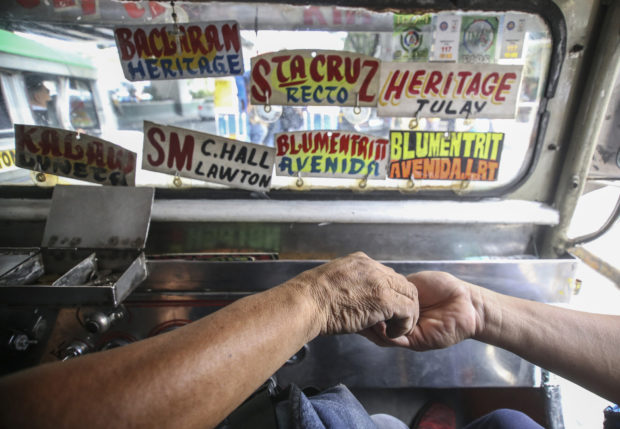Commuters to shoulder P1 fare hike, says Piston

A jeepney driver give the passenger a change after paying bigger amount for the fare at Taft avenue, Manila on Thursday. The LTFRB is expected to implement the 1 peso jeepney fare hike on Thursday afternoon. PHOTO BY EARVIN PERIAS
Instead of listening to drivers’ and operators’ suggestions on how to deal with rising fuel prices, the government dumped the problem on commuters by allowing an increase in fares, the leader of the country’s largest transport group said on Thursday.
The Land Transportation Franchising and Regulatory Board (LTFRB) approved on Wednesday night a P1 provisional increase on the minimum fare for jeepneys plying routes in Metro Manila, Central Luzon and Calabarzon.
Once the LTFRB order is signed — expected late Thursday — jeepneys could charge P9 for the first 4 kilometers.
The current minimum fare is P8.
“The government passed the problem of high oil prices to poor commuters,” George San Mateo, president of Pinagkaisahang Samahan ng mga Tsuper at Opereytor Nationwide (Piston), said on Thursday.
Article continues after this advertisementThe public as scapegoat
Article continues after this advertisement“It’s sad, because they treated the commuters like a scapegoat,” he said.
San Mateo said Piston had suggested to the government to suspend the enforcement of the Tax Reform for Acceleration and Inclusion (TRAIN) Act to lower fuel prices and avoid a raise in fares.
“The problem is, the government does not want to listen. There are many possible solutions and suspending the enforcement of the TRAIN law is one of them. It is really the cause of the people’s present economic difficulties,” he said.
The TRAIN law took effect on Jan. 1. It raised the ceiling on tax-exempt income but imposed higher taxes on oil products and other goods, amplifying the effects of firmer global oil prices in recent months.
A chain reaction triggered by the enforcement of the law pushed inflation to 5.2 percent in June, the fastest in more than five months.
San Mateo appealed to commuters not to blame jeepney drivers for the fare hike.
“Let’s not blame the jeepney drivers. Blame this on the government’s policies,” he said.
Blame world oil prices
Malacañang, however, blamed the fare hike on rising world oil prices.
“It’s a result [of] the increase in the price of petroleum. But we assure you that if the price of petroleum goes down, there would be corresponding adjustments as well,” presidential spokesperson Harry Roque told reporters.
Commuters denounced the LTFRB decision.
“As if the people aren’t already spending too much because of TRAIN,” said University of Santo Tomas literature major Celine Garcia.
“Basic goods have become expensive. Now fare have also increased,” Garcia, who is a working student, said.
“I enjoy student discounts and the fare hike means I have to pay P8 now. Every peso counts,” she said.
Nicolas Celo, a junior high school student, expressed dismay at the fare hike, which would affect his daily allowance.
But he conceded that jeepney drivers were burdened with high fuel prices.
“We also need to buckle down [for them],” he said.
Innah Pardinan, who works in advertising and commutes between Manila and Quezon City every day, said the jeepney fare hike might force her to consider other options, like the UV Express, which costs a few pesos more but is more convenient. — WITH A REPORT FROM JULIE M. AURELIO